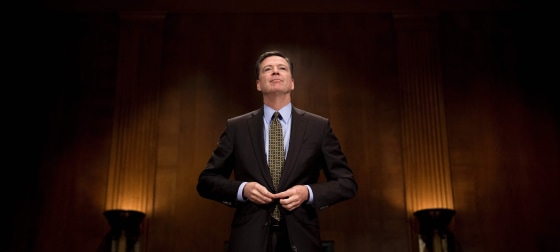Former FBI Director James Comey received high marks from members of both sides of the aisle until the Hillary Clinton email controversy.
Here’s a look at how Comey, fired by President Donald Trump on Tuesday, went from being a well-regarded leader of one of the government’s most respected law enforcement agencies to a Washington lightning rod.
Sept. 4, 2013: Comey sworn in as director of the FBI, after being appointed by President Barack Obama
March 2, 2015: The New York Times reports that Clinton used a personal email account while serving as secretary of state.
July 24, 2015: Government watchdogs announced the discovery of classified information on Clinton’s server. The discovery prompts inspectors general at the State Department and office of the director of National Intelligence to refer the matter to the FBI.
August 4, 2015: The Washington Post reports the FBI is investigating the security of Clinton’s private email server.
July 1, 2016: Attorney General Loretta Lynch said she would accept the recommendation from the FBI and career prosecutors at the conclusion of their investigation into Clinton’s emails. Lynch came under fire for an tarmac meeting with former President Bill Clinton while the investigation was ongoing.
July 5, 2016: Comey announces at a press conference that he would recommend no criminal charges against Clinton, but slammed the Democratic presidential nominee for being “extremely careless.” The announcement was an unusually public event to announce he did not believe Clinton committed any criminal wrongdoing.
July 7, 2016: Comey tells the House Oversight Committee that Clinton “did not break the law.”
July 2016, exact date unknown: The FBI opens an investigation into Russian attempts to meddle in the impending election, which includes probing any connections between Republican Donald Trump's campaign and the Russian government. It does not disclose the investigation publicly. The investigation's existence (and when it began) was confirmed nine months later when Comey testified before Congress on March 20, 2017.
Sept. 28, 2016: The FBI head tells the House Judiciary Committee he has no plans to re-open the investigation into Clinton, despite GOP calls to do so. "You can call us wrong, but don't call us weasels. We are not weasels," he said.
Oct. 28, 2016: The FBI announces in a letter to Congress that it is reviewing a new batch of emails related to the Clinton investigation. Investigators found the messages during a probe into former Rep. Anthony Weiner, husband of top Clinton aide Huma Abedin.
Nov. 6, 2016: Two days ahead of the election, Comey announces the bureau has completed its review of the new batch of emails and that the FBI won't change its original conclusion that Clinton should not be prosecuted. The emails were found to have been previously discovered.
Nov. 8, 2016: Republican Donald Trump defeats Clinton in the presidential race.
Jan. 12, 2017: The Justice Department Inspector General announces he will review the FBI’s handling of the email case.
Mar. 20, 2017: Comey publicly confirmed the FBI is investigating whether the Trump campaign coordinated with Russia during the 2016 election.
May 3, 2017: The FBI director passionately defended his decision to reopen the Clinton email investigation so close to the election. Democrats grill Comey for what they contend is his unusually public handling of the case.
May 9, 2017: The White House announces Comey has been dismissed as FBI head.

